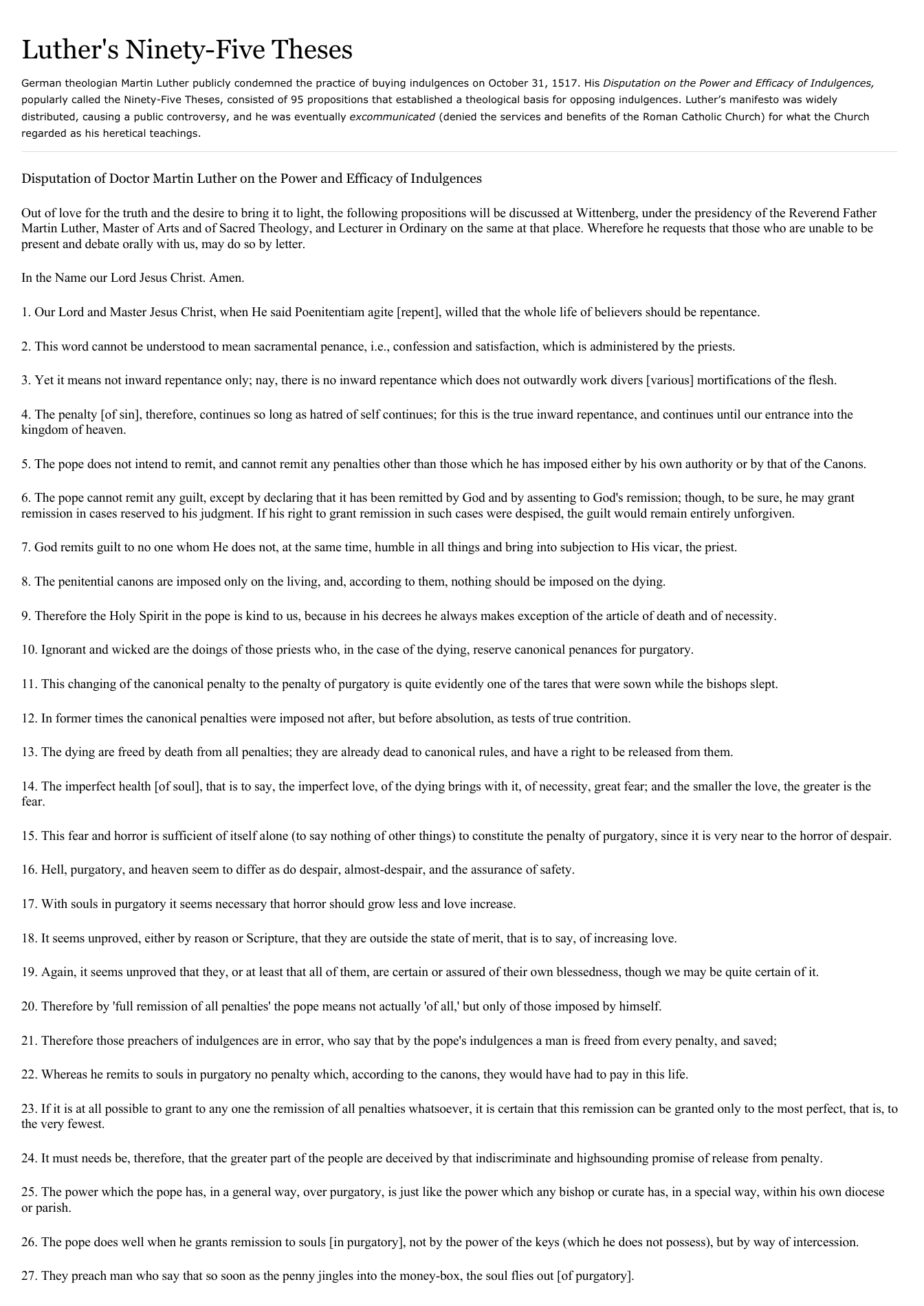Luther's Ninety-Five ThesesGerman theologian Martin Luther publicly condemned the practice of buying indulgences on October 31, 1517.
Publié le 18/05/2020

Extrait du document
«
Luther's Ninety-Five Theses
German theologian Martin Luther publicly condemned the practice of buying indulgences on October 31, 1517.
His Disputation on the Power and Efficacy of Indulgences, popularly called the Ninety-Five Theses, consisted of 95 propositions that established a theological basis for opposing indulgences.
Luther’s manifesto was widelydistributed, causing a public controversy, and he was eventually excommunicated (denied the services and benefits of the Roman Catholic Church) for what the Church regarded as his heretical teachings.
Disputation of Doctor Martin Luther on the Power and Efficacy of Indulgences
Out of love for the truth and the desire to bring it to light, the following propositions will be discussed at Wittenberg, under the presidency of the Reverend FatherMartin Luther, Master of Arts and of Sacred Theology, and Lecturer in Ordinary on the same at that place.
Wherefore he requests that those who are unable to bepresent and debate orally with us, may do so by letter.
In the Name our Lord Jesus Christ.
Amen.
1.
Our Lord and Master Jesus Christ, when He said Poenitentiam agite [repent], willed that the whole life of believers should be repentance.
2.
This word cannot be understood to mean sacramental penance, i.e., confession and satisfaction, which is administered by the priests.
3.
Yet it means not inward repentance only; nay, there is no inward repentance which does not outwardly work divers [various] mortifications of the flesh.
4.
The penalty [of sin], therefore, continues so long as hatred of self continues; for this is the true inward repentance, and continues until our entrance into thekingdom of heaven.
5.
The pope does not intend to remit, and cannot remit any penalties other than those which he has imposed either by his own authority or by that of the Canons.
6.
The pope cannot remit any guilt, except by declaring that it has been remitted by God and by assenting to God's remission; though, to be sure, he may grantremission in cases reserved to his judgment.
If his right to grant remission in such cases were despised, the guilt would remain entirely unforgiven.
7.
God remits guilt to no one whom He does not, at the same time, humble in all things and bring into subjection to His vicar, the priest.
8.
The penitential canons are imposed only on the living, and, according to them, nothing should be imposed on the dying.
9.
Therefore the Holy Spirit in the pope is kind to us, because in his decrees he always makes exception of the article of death and of necessity.
10.
Ignorant and wicked are the doings of those priests who, in the case of the dying, reserve canonical penances for purgatory.
11.
This changing of the canonical penalty to the penalty of purgatory is quite evidently one of the tares that were sown while the bishops slept.
12.
In former times the canonical penalties were imposed not after, but before absolution, as tests of true contrition.
13.
The dying are freed by death from all penalties; they are already dead to canonical rules, and have a right to be released from them.
14.
The imperfect health [of soul], that is to say, the imperfect love, of the dying brings with it, of necessity, great fear; and the smaller the love, the greater is thefear.
15.
This fear and horror is sufficient of itself alone (to say nothing of other things) to constitute the penalty of purgatory, since it is very near to the horror of despair.
16.
Hell, purgatory, and heaven seem to differ as do despair, almost-despair, and the assurance of safety.
17.
With souls in purgatory it seems necessary that horror should grow less and love increase.
18.
It seems unproved, either by reason or Scripture, that they are outside the state of merit, that is to say, of increasing love.
19.
Again, it seems unproved that they, or at least that all of them, are certain or assured of their own blessedness, though we may be quite certain of it.
20.
Therefore by 'full remission of all penalties' the pope means not actually 'of all,' but only of those imposed by himself.
21.
Therefore those preachers of indulgences are in error, who say that by the pope's indulgences a man is freed from every penalty, and saved;
22.
Whereas he remits to souls in purgatory no penalty which, according to the canons, they would have had to pay in this life.
23.
If it is at all possible to grant to any one the remission of all penalties whatsoever, it is certain that this remission can be granted only to the most perfect, that is, tothe very fewest.
24.
It must needs be, therefore, that the greater part of the people are deceived by that indiscriminate and highsounding promise of release from penalty.
25.
The power which the pope has, in a general way, over purgatory, is just like the power which any bishop or curate has, in a special way, within his own dioceseor parish.
26.
The pope does well when he grants remission to souls [in purgatory], not by the power of the keys (which he does not possess), but by way of intercession.
27.
They preach man who say that so soon as the penny jingles into the money-box, the soul flies out [of purgatory]..
»
↓↓↓ APERÇU DU DOCUMENT ↓↓↓
Liens utiles
- La fête de la RéformationEn souvenir de l'affichage des 95 thèses de Martin Luther, dénonçantle trafic des indulgences.
- Biographie Martin Luther King
- Luther, Martin
- Martin Luther.
- Pasteur Martin Luther King1929-1968Sorte de Moïse moderne dont les espoirs d'un monde de liberté et de justice pour tousapparaissent parfois comme un rêve.


